BusinessEurope Headlines No. 2022-14
Discussion with Members of the Ukrainian Parliament
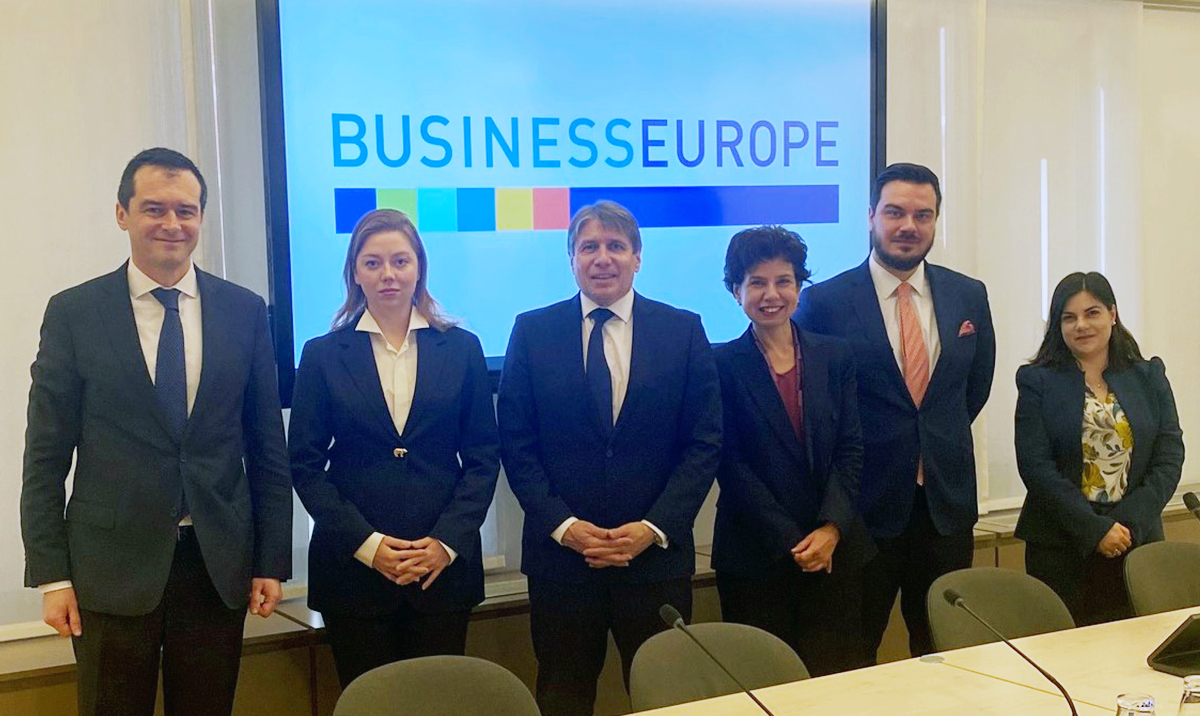
BusinessEurope Director General Markus J. Beyrer met with a delegation of Members of the Ukrainian Parliament on 22 April. It was an opportunity to reiterate our strong condemnation of Russia’s aggression against Ukraine, discuss the situation on the ground, the needs of the country to rebuild its economy and how European business can help in this respect. Ukraine is setting up a restauration roadmap to rebuild infrastructure destroyed by the war, provide housing and help industries return to the country and reorganise. Sectors that are currently under consideration include, among others, energy (gas, oil, hydrogen), Information Technologies (IT), automotive, raw materials, agriculture and food. At the same time, finding viable solutions to the transport and logistics problems caused by the closed ports and the congestion at the land borders will remain a key priority. BusinessEurope will continue to maintain close contacts with the Ukrainian Mission to the EU, the government and business representatives, in our efforts to support the Ukrainian economy.
Contacts: Luisa Santos, Sofia Bournou
Trade Agreements: key to “filling the trade gap”
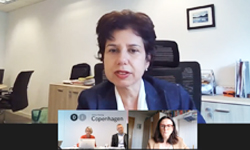 On 26 April, BusinessEurope Deputy Director General Luisa Santos joined the event "Filling the trade gap – where should the EU turn after Russia?", organised by the Confederation of Danish Industry (DI). “We are at the crossroads”, she said, explaining that for governments, the key question is how to avoid falling into protectionism and providing easy solutions to complex problems. At the same time, businesses need to adapt to a new reality, in an environment not favourable to global supply chains, facing compartmentalisation of markets and where business decisions are less and less separated from foreign policy. “Sourcing diversification can provide solutions and an ambitious EU trade policy is key in this regard”, she highlighted. Trade Agreements are, for instance, important to fill the gap and we need those that are already concluded in place without delay. Santos stressed that these agreements are not only important from an economic point of view, but also from a geopolitical one. You may access the recording of the event here.
On 26 April, BusinessEurope Deputy Director General Luisa Santos joined the event "Filling the trade gap – where should the EU turn after Russia?", organised by the Confederation of Danish Industry (DI). “We are at the crossroads”, she said, explaining that for governments, the key question is how to avoid falling into protectionism and providing easy solutions to complex problems. At the same time, businesses need to adapt to a new reality, in an environment not favourable to global supply chains, facing compartmentalisation of markets and where business decisions are less and less separated from foreign policy. “Sourcing diversification can provide solutions and an ambitious EU trade policy is key in this regard”, she highlighted. Trade Agreements are, for instance, important to fill the gap and we need those that are already concluded in place without delay. Santos stressed that these agreements are not only important from an economic point of view, but also from a geopolitical one. You may access the recording of the event here.
Contact: Sofia Bournou
Measures needed to simplify and accelerate deployment of renewable energy
 On 12 April BusinessEurope submitted comments to the public consultation on the permit-granting process for renewable energy projects and Power Purchase Agreements (PPA). In the comments, we highlighted that lengthy permit-granting processes and administrative procedures are hindering large-scale deployment of renewable energy sources in the EU. As significant delays in granting permits for a renewable investment are still widely observed, it is crucial to fully and effectively enforce measures from the Renewable Energy Directive currently in force. We also mentioned that establishing a special category of projects with decreased procedure length, especially for those placed on clearly defined abandoned or unused areas, could significantly speed up and simplify the administrative process. When it comes to the Power Purchase Agreements, we expressed the need for further measures to encourage PPA contracts, which help ensure a long-term, stable, and affordable supply of renewable energy to energy-intensive companies, especially at times of high market volatility. Apart from the regulatory measures, it is important to consider the shaping and firming cost as well, which could be reduced through a third-party aggregation.
On 12 April BusinessEurope submitted comments to the public consultation on the permit-granting process for renewable energy projects and Power Purchase Agreements (PPA). In the comments, we highlighted that lengthy permit-granting processes and administrative procedures are hindering large-scale deployment of renewable energy sources in the EU. As significant delays in granting permits for a renewable investment are still widely observed, it is crucial to fully and effectively enforce measures from the Renewable Energy Directive currently in force. We also mentioned that establishing a special category of projects with decreased procedure length, especially for those placed on clearly defined abandoned or unused areas, could significantly speed up and simplify the administrative process. When it comes to the Power Purchase Agreements, we expressed the need for further measures to encourage PPA contracts, which help ensure a long-term, stable, and affordable supply of renewable energy to energy-intensive companies, especially at times of high market volatility. Apart from the regulatory measures, it is important to consider the shaping and firming cost as well, which could be reduced through a third-party aggregation.
![]() Contact: Agata Zalewska
Contact: Agata Zalewska
Upholding consumer rights in non-EU purchases helps uphold fair competition
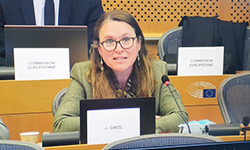 BusinessEurope believes that enforcing consumer law vis-à-vis non-EU sellers needs to remain a priority in the EU consumer policy. This is important to uphold fair competition between EU and non-EU sellers and to continue building trust in e-commerce, as bad behaviours affect all EU businesses as a whole. Solutions include better awareness among consumers when shopping outside of the EU and better enforcement by equipping national authorities to better identify and deal with breaches. These were some of the messages voiced by Jolanda Girzl, Vice-Chair of BusinessEurope’s Consumer Marketing Working Group during a hearing of the European Parliament's Committee on Internal Market and Consumer Protection (IMCO) on “Upholding Consumer rights when shopping outside the EU”, on 20 April 2022.
BusinessEurope believes that enforcing consumer law vis-à-vis non-EU sellers needs to remain a priority in the EU consumer policy. This is important to uphold fair competition between EU and non-EU sellers and to continue building trust in e-commerce, as bad behaviours affect all EU businesses as a whole. Solutions include better awareness among consumers when shopping outside of the EU and better enforcement by equipping national authorities to better identify and deal with breaches. These were some of the messages voiced by Jolanda Girzl, Vice-Chair of BusinessEurope’s Consumer Marketing Working Group during a hearing of the European Parliament's Committee on Internal Market and Consumer Protection (IMCO) on “Upholding Consumer rights when shopping outside the EU”, on 20 April 2022.
Contact: Oliveira Pedro
Reinforcing the links between national and European social dialogue
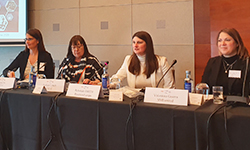 Social dialogue is at a turning point. Despite the challenges that social partners have faced during the pandemic, we are now at a positive moment in time to jointly tackle some key topics, including telework and the right to disconnect. Furthermore, we welcome the impetus at EU-level in the run up to the European Commission’s social dialogue initiative announced for September and underline our commitment to improve collective bargaining at all the appropriate levels in the Member States. A key challenge ahead is to strengthen the links between national and European social dialogue. These were the main messages given by BusinessEurope Social Affairs Deputy Director Rebekah Smith at the opening of the cluster seminar on “Reinforcing the EU social dialogue and industrial relations”, organised by the European social partners in Madrid on 26 and 27 April. This seminar brought together social partners representatives from Czechia, Germany, Hungary and Spain, who exchanged information on their industrial relations models, evolving practices and upcoming priorities to underpin the development of social dialogue and collective bargaining in their respective countries.
Social dialogue is at a turning point. Despite the challenges that social partners have faced during the pandemic, we are now at a positive moment in time to jointly tackle some key topics, including telework and the right to disconnect. Furthermore, we welcome the impetus at EU-level in the run up to the European Commission’s social dialogue initiative announced for September and underline our commitment to improve collective bargaining at all the appropriate levels in the Member States. A key challenge ahead is to strengthen the links between national and European social dialogue. These were the main messages given by BusinessEurope Social Affairs Deputy Director Rebekah Smith at the opening of the cluster seminar on “Reinforcing the EU social dialogue and industrial relations”, organised by the European social partners in Madrid on 26 and 27 April. This seminar brought together social partners representatives from Czechia, Germany, Hungary and Spain, who exchanged information on their industrial relations models, evolving practices and upcoming priorities to underpin the development of social dialogue and collective bargaining in their respective countries.
Contact: Isaline Ossieur
EU-Japan cooperation in the Indo-Pacific
 At a meeting organised by the European Policy Centre on 26 April, BusinessEurope Senior Adviser Elena Suárez exchanged views on how the EU and Japan, as like-minded partners, can advance their own strategic agendas by reaffirming their strong commitment to the rules-based international order. For instance, the global trading system, the climate change regime, the multilateral security arrangements to deal with traditional and emerging threats, as well as the political fallout brought by the Covid-19 pandemic and the Russian war on Ukraine. She described the challenges and opportunities that EU business faces in the Indo-Pacific and in Japan in particular. Suárez highlighted the economic and strategic importance of the Indo-Pacific, as well as the importance to build closer alliances with like-minded partners and work on the diversification of supply chains for EU companies. “The EU and Japan's Economic Partnership Agreement has proven to be the bedrock of the EU-Japan economic relationship during the last three years. While this is positive, the EU should build on the strong partnership with Japan and develop further cooperation in several areas such as the green and digital agendas”, she commented. Suárez added that close coordination of the EU and Japan regarding sanctions against Russia and Belarus remains also key. The other speakers at the event were Adeline Hinderer, Head of Unit at the European Commission’s Directorate-General for Trade, and Yoko Iwama, Professor of International Relations and Director of the Strategic Studies Program and the Maritime Safety and Security Policy Program at the National Graduate Institute for Policy Studies.
At a meeting organised by the European Policy Centre on 26 April, BusinessEurope Senior Adviser Elena Suárez exchanged views on how the EU and Japan, as like-minded partners, can advance their own strategic agendas by reaffirming their strong commitment to the rules-based international order. For instance, the global trading system, the climate change regime, the multilateral security arrangements to deal with traditional and emerging threats, as well as the political fallout brought by the Covid-19 pandemic and the Russian war on Ukraine. She described the challenges and opportunities that EU business faces in the Indo-Pacific and in Japan in particular. Suárez highlighted the economic and strategic importance of the Indo-Pacific, as well as the importance to build closer alliances with like-minded partners and work on the diversification of supply chains for EU companies. “The EU and Japan's Economic Partnership Agreement has proven to be the bedrock of the EU-Japan economic relationship during the last three years. While this is positive, the EU should build on the strong partnership with Japan and develop further cooperation in several areas such as the green and digital agendas”, she commented. Suárez added that close coordination of the EU and Japan regarding sanctions against Russia and Belarus remains also key. The other speakers at the event were Adeline Hinderer, Head of Unit at the European Commission’s Directorate-General for Trade, and Yoko Iwama, Professor of International Relations and Director of the Strategic Studies Program and the Maritime Safety and Security Policy Program at the National Graduate Institute for Policy Studies.
Contact: Elena Suárez
EU digital transformation can lead to employment growth
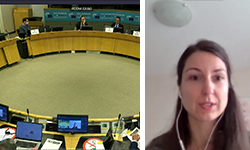 Speaking at the hearing "Digital identity, data sovereignty and the path towards a just digital transition for citizens living in the information society", BusinessEurope Adviser on Digital Economy Svetlana Stoilova highlighted that the key objectives of the EU digital transformation must be competitiveness and more integration of the internal market through digital policies. The event, which took place on 19 April, was organised by the European Economic and Social Committee (EESC). Svetlana exchanged views with EESC members preparing an own initiative report on the subject. She stressed that legislation must be looked through the prism of “cost of compliance” and proportionality, because if doing business becomes more costly in Europe, SMEs will face more challenges, hence the SME test is extremely important. As stated in the European social partners framework agreement on digitalisation, the digital transformation brings clear benefits for employers, workers and jobseekers alike, in terms of new job opportunities, increased productivity, improvements in working conditions and new ways of organising work and improved quality of services and products. “Overall, with the right strategies, digitalisation can lead to employment growth and job retention”, she concluded.
Speaking at the hearing "Digital identity, data sovereignty and the path towards a just digital transition for citizens living in the information society", BusinessEurope Adviser on Digital Economy Svetlana Stoilova highlighted that the key objectives of the EU digital transformation must be competitiveness and more integration of the internal market through digital policies. The event, which took place on 19 April, was organised by the European Economic and Social Committee (EESC). Svetlana exchanged views with EESC members preparing an own initiative report on the subject. She stressed that legislation must be looked through the prism of “cost of compliance” and proportionality, because if doing business becomes more costly in Europe, SMEs will face more challenges, hence the SME test is extremely important. As stated in the European social partners framework agreement on digitalisation, the digital transformation brings clear benefits for employers, workers and jobseekers alike, in terms of new job opportunities, increased productivity, improvements in working conditions and new ways of organising work and improved quality of services and products. “Overall, with the right strategies, digitalisation can lead to employment growth and job retention”, she concluded.
Contact: Svetlana Stoilova
Calendar 
- 10 May: European Economic Governance: A new rulebook?
- 11-12 May: 36th Madrid Forum
- 3 June: BusinessEurope Council of Presidents
- 8-9 June: Reuters Event: Responsible Business Europe 2022
Not yet a subscriber? Register here.
Reminder: please have a look at our privacy policy